by Joanne Ivancic (Advanced Biofuels USA) Every ABLC, held each Spring in Washington, DC, reveals the zeitgeist of the renewable sustainable fuels world and bits of the bioeconomy it intesects. This year was no exception with the following Key Words providing a way to summarize the thoughts and ideas of people trying to mitigate climate change through renewable, sustainable fuels and related products.
This year from the first day, one key word was Carbon Intensity or CI.
CI answers the question of how to compare apples to oranges, or, more appropriately, corn to corn stover to woody biomass to rice straw in India to wheat straw in Romania to used cooking oil in Singapore to tall oil in Finland to captured carbon and electrolyzed hydrogen in Germany to camelina in Alberta to canola in the EU…… and all of these and more, to fossil fuels.
In other words, the key common denominator, the primary point of comparison among fuels has become how much carbon emission is created or avoided during the life cycle (from seed to wheel; from well to wheel) of each fuel.
It became clear that no research in this area is conducted; no financing provided, no policy developed without consideration of CI. And, although the GREET (Greenhouse Gases Regulated Emissions and Energy Use in Transportation) model developed by Argonne National Laboratory years ago and updated annually, is considered by many the gold standard and the foundtion for many systems for calculating a CI score, it is also clear that there is no common international definition of CI, not even consistent national definitions or calculations. Expect that issue to be a topic of international discussions, with CI a key word not only in the ABLC, but in every conference on this topic around the world.
 Starting off the conference and trying to demonstrate Unity of purpose for the Biden Administration in promoting biotechnoloyg and biomanufacturing innovation were representatives of the White House Office of Science and Technology Policy, Deparment of Commerce, National Institutes of Health, National Science Foundation, US Departments of Agriculture and Energy.
Starting off the conference and trying to demonstrate Unity of purpose for the Biden Administration in promoting biotechnoloyg and biomanufacturing innovation were representatives of the White House Office of Science and Technology Policy, Deparment of Commerce, National Institutes of Health, National Science Foundation, US Departments of Agriculture and Energy.
This brings us to another set of key words: Unity, Cooperation, Collaboration. Over and over we heard calls urging cooperation, slides that touted the importance of team work and speakers expounding on the urgency of collaboration if new “low CI” fuels will be enabled to help save the world from the ravages of climate change.
There is clear Unity in this audience that the purpose of the work being done by everyone in the room at this Advanced Bioeconomy Leadership Conference and probably those who participated online, is to mitigate the effects of climate change by researching, funding, developing, producing and deploying defossilized fuels and chemicals.
These calls for unity recognize this shared purpose, and also acknowledge that everyone doesn’t agree on how to achieve it. The conference nurtured and facilitated opportunities for communication and development of compatible paths to a non-fossil carbon future. As Omar Hamid of Advisioan said, “We need to work together to meet these obligations we have set for ourselves.”
It also enabled harsh and candid analysis of some proposed paths or technologies.
Which brings us to another key phrase, Carbon Capture. Whether carbon capture and storage/sequestration or carbon capture and utilization, just about every speaker (technology, policy, financing and more) talked about carbon capture as either a key component or a future option for reducing that CI score.
 Jim Lane introduces the Due Diligence Wolfpack, L-R David Dodds; Dodds & Associates; James Iademarco, Strategic Avalanche; Michele Rubio, industry consultant; Paul Bryan, Origin Materials; Steve Slome, Nexat ECA; Steve Weiss, Grey Heron Consulting; Sam Nejame, Promotum; Joel Stone, ConVergince
Jim Lane introduces the Due Diligence Wolfpack, L-R David Dodds; Dodds & Associates; James Iademarco, Strategic Avalanche; Michele Rubio, industry consultant; Paul Bryan, Origin Materials; Steve Slome, Nexat ECA; Steve Weiss, Grey Heron Consulting; Sam Nejame, Promotum; Joel Stone, ConVergince
Most were vague about what this might look like in practice, so it was gratifying that conference organizer and publisher and editor of The Daily Digest, Jim Lane, had “the Due Diligence Wolfpack”, a group of eight gregarious experts in relevant science, engineering and finance, explore, in a free-wheeling animated discussion, a number of representative carbon capture projects. They exposed the significant weaknesses of most as “stupid” and worse, pointing out other less expensive, less energy intensive, more effective ways to pull carbon from the atmosphere and to avoid adding more carbon to the atmosphere in the process.
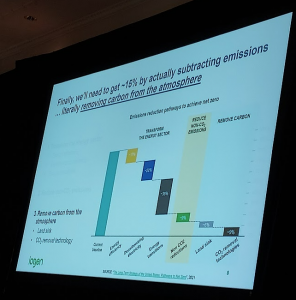 Iogen's plan recognizes the need, according to organizations like the Intergovernmental Panel on Climate Change (IPCC), to remove carbon from the atomosphere.
Iogen's plan recognizes the need, according to organizations like the Intergovernmental Panel on Climate Change (IPCC), to remove carbon from the atomosphere.
The ability of plants to do this with photosynthesis was repeatedly mentioned as a sort of benchmark. They compared the amount of carbon that proposed “Rube Goldberg” machines might extract from the air for burial in the ground to the amount of biomass or solid carbon from biomass that could be similarly buried in Yucca Mountain, for example, since it could be available as there is so much opposition to burying nuclear waste there.
Some projects such as the Summit Carbon Solutions pipeline project check a lot of positive boxes; but the panelists generally agreed that more research needs to be done about underground carbon storage and the public needs to get more verifiable information about CO2 transport and storage before they can support it 100%.
Another key word was Modular and a number of presentations mentioned this model of building facilities. It’s less expensive and builds to the relevant scale, depending on feedstock availability and other factors. You heard, “Skid built, not stick built” and “We cannot build the mega plants of yesteryear,” referencing the enormous oil refineries around the world. That said, there were also discussions about keeping the multi-product model of oil refineries while repurposing them if light duty vehicles transition to electric power lessens the need for petroleum fuel.
Similarly, a number of speakers also talked about using conventional equipment in a better way. From new applications of anaerobic digestion to using existing farming equipment to harvest new crops.
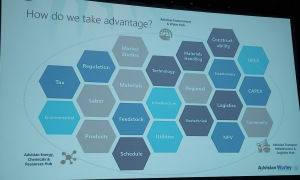 Omar Hamid, Group Manager for the Low Carbon Fuels Team at Advisian illustrated some of the stepping stones on the Journey to mitigating climate change. It's not just Feedstock and technologies.
Omar Hamid, Group Manager for the Low Carbon Fuels Team at Advisian illustrated some of the stepping stones on the Journey to mitigating climate change. It's not just Feedstock and technologies.
Ten or Twelve. About 15 years ago the US Department of Energy was hosting annual conferences of this magnitude with a series, Biomass 2008, Biomass 2009…… Around this time ABLC conferences began. It was an era of $140/barrel oil, BP rebranding as Beyond Petroleum and the institution of the Renewable Fuel Standard to force renewable fuels into the marketplace. Investors believed that they could get 20% return on investment in 2 years and President George W. Bush mentioned in a State of the Union speech, converting to fuels made from switchgrass. Researchers expected their innovative ideas would be produced at commercial scale in 5 years.
We’ve learned a lot since then. “Cellulosic biofuel,” the darling of policy initiatives, was much harder to make than anyone predicted. Not to mention related due diligence investigations for investors, permitting, engine design and infrastructure development. Algae was going to be the most sustainable alternative because it didn’t take up cropland. And drop-in fuels that had all the relevant characteristics of petroleum fuels would easily substitute for them. It wasn't that simple.
Ten. That was the number most presenters agreed was the minimum required to take new, never-been-done-before technologies to the market.
Many are taking longer. For example, Rebecca Boudreaux of Oberon noted that she has been with the company for 12 years. Her work didn't only include the science, technology and engineering of making renewable DME, a fuel on its own that can also serve as a hydrogen carrier and complement to fossil and renewable propane. When you are doing things that have never been done before for a problem (climate change) that has never been encountered in quite this way before, your job may also require getting laws, regulations and common practices updated and changed to accommodate new solutions to new challenges. And all that takes time, Ten years, Twelve years, and more.
All now know what they didn’t know before. And many others foundered along the way, revealing the limitations of those expectations. The positive take-away from this conference is that some of those people who started out 10-15 years ago are achieving their dreams. There were devastating ups and downs, but they found paths through those unknown lands. They persisted and appear to be on the road to success.
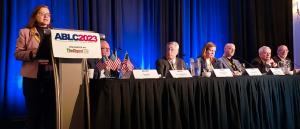 Among those leading the Journey to Net Zero Futures are (L-R) Jennifer Holmgren; CEO LanzaTech, Tim Zenk, President, Molecule; Michael Darcy, CEO, DG Fuel;, Rebecca Groen, Director, Sustainable Fuels at SHV Energy; Michel Chomet, EVP Enerkem; Brian Foody, CEO Iogen and Richard Palmer, CEO Global Clean Energy Holdings
Among those leading the Journey to Net Zero Futures are (L-R) Jennifer Holmgren; CEO LanzaTech, Tim Zenk, President, Molecule; Michael Darcy, CEO, DG Fuel;, Rebecca Groen, Director, Sustainable Fuels at SHV Energy; Michel Chomet, EVP Enerkem; Brian Foody, CEO Iogen and Richard Palmer, CEO Global Clean Energy Holdings
And, also presenting at this conference were those just starting this Journey, another key word heard over and over throughout the conference. This is not just a walk in the park. It is a Journey, a Grail Quest, with hazards to overcome, riddles to solve and blessings to savor along the way.
One type of riddle the seekers have to contend with is another key word, Feedstock.
Feedstock is whatever you convert to make that sustainable fuel, renewable chemical or other bioeconomy or recycled carbon product. Feedstock can be anything from the corn, sugarcane, soybeans, used cooking oil and other plant oils that are used today to make ethanol, biodiesel, renewable diesel, jetfuel, and gasoline. It can also include cassava, canola/rapeseed, camelina, energy cane, grasses, hemp, flue gas, industrial waste gases, municipal solid waste, captured carbon, hydrogen (and water as the feedstock for electrolysis to obtain hydrogen), other agricultural and forest wastes and residues, woody biomass and more that are also being used or developed as feedstock for the bio- and circular economies.
Everyone talked about feedstock, about the high levels of competition for FOG (fats, oils, grease) for HEFA (Hydro-processed esters and fatty acids) jetfuel, renewable diesel and biodiesel. And about the need to develop additional feedstocks like lignocellulosic materials, sugars and alcohols and economical conversion technologies to go with them.
Although e-fuels (electrofuels) might be a key word in the future; e-fuels were mostly mentioned in passing such as in discussions about EU policy aspirations and about possible future uses (among many competing ones) for hydrogen (preferably “green”) and captured carbon.
ABLC is always a great place to take the temperature of the world of sustainable, renewable fuels and products. Wide-ranging topics with presentations cover everything from feedstock and technology developments to policy issues, opportunities and challenges of public and private project financing and investment and more.
Being in-person again enables what Jim Lane calls “networking like crazy”, informal hallway conversations, and a chance to meet and talk with presenters, to introduce yourself and arrange for follow-up meetings, to ask questions and find answers.
And, to learn from those who are moving toward success and from the mistakes and pitfalls that sidelined or destroyed others. Watch this site for continuing coverage, presentations from the conference and more.
Nearly 55,000 articles in our online library!
Use the categories and tags listed below to access the nearly 50,000 articles indexed on this website.
Advanced Biofuels USA Policy Statements and Handouts!
- For Kids: Carbon Cycle Puzzle Page
- Why Ethanol? Why E85?
- Just A Minute 3-5 Minute Educational Videos
- 30/30 Online Presentations
- “Disappearing” Carbon Tax for Non-Renewable Fuels
- What’s the Difference between Biodiesel and Renewable (Green) Diesel? 2020 revision
- How to De-Fossilize Your Fleet: Suggestions for Fleet Managers Working on Sustainability Programs
- New Engine Technologies Could Produce Similar Mileage for All Ethanol Fuel Mixtures
- Action Plan for a Sustainable Advanced Biofuel Economy
- The Interaction of the Clean Air Act, California’s CAA Waiver, Corporate Average Fuel Economy Standards, Renewable Fuel Standards and California’s Low Carbon Fuel Standard
- Latest Data on Fuel Mileage and GHG Benefits of E30
- What Can I Do?
Donate
DonateARCHIVES
- February 2026
- January 2026
- December 2025
- November 2025
- October 2025
- September 2025
- August 2025
- July 2025
- June 2025
- May 2025
- April 2025
- March 2025
- February 2025
- January 2025
- December 2024
- November 2024
- October 2024
- September 2024
- August 2024
- July 2024
- June 2024
- May 2024
- April 2024
- March 2024
- February 2024
- January 2024
- December 2023
- November 2023
- October 2023
- September 2023
- August 2023
- July 2023
- June 2023
- May 2023
- April 2023
- March 2023
- February 2023
- January 2023
- December 2022
- November 2022
- October 2022
- September 2022
- August 2022
- July 2022
- June 2022
- May 2022
- April 2022
- March 2022
- February 2022
- January 2022
- December 2021
- November 2021
- October 2021
- September 2021
- August 2021
- July 2021
- June 2021
- May 2021
- April 2021
- March 2021
- February 2021
- January 2021
- December 2020
- November 2020
- October 2020
- September 2020
- August 2020
- July 2020
- June 2020
- May 2020
- April 2020
- March 2020
- February 2020
- January 2020
- December 2019
- November 2019
- October 2019
- September 2019
- August 2019
- July 2019
- June 2019
- May 2019
- April 2019
- March 2019
- February 2019
- January 2019
- December 2018
- November 2018
- October 2018
- September 2018
- August 2018
- July 2018
- June 2018
- May 2018
- April 2018
- March 2018
- February 2018
- January 2018
- December 2017
- November 2017
- October 2017
- September 2017
- August 2017
- July 2017
- June 2017
- May 2017
- April 2017
- March 2017
- February 2017
- January 2017
- December 2016
- November 2016
- October 2016
- September 2016
- August 2016
- July 2016
- June 2016
- May 2016
- April 2016
- March 2016
- February 2016
- January 2016
- December 2015
- November 2015
- October 2015
- September 2015
- August 2015
- July 2015
- June 2015
- May 2015
- April 2015
- March 2015
- February 2015
- January 2015
- December 2014
- November 2014
- October 2014
- September 2014
- August 2014
- July 2014
- June 2014
- May 2014
- April 2014
- March 2014
- February 2014
- January 2014
- December 2013
- November 2013
- October 2013
- September 2013
- August 2013
- July 2013
- June 2013
- May 2013
- April 2013
- March 2013
- February 2013
- January 2013
- December 2012
- November 2012
- October 2012
- September 2012
- August 2012
- July 2012
- June 2012
- May 2012
- April 2012
- March 2012
- February 2012
- January 2012
- December 2011
- November 2011
- October 2011
- September 2011
- August 2011
- July 2011
- June 2011
- May 2011
- April 2011
- March 2011
- February 2011
- January 2011
- December 2010
- November 2010
- October 2010
- September 2010
- August 2010
- July 2010
- June 2010
- May 2010
- April 2010
- March 2010
- February 2010
- January 2010
- December 2009
- November 2009
- October 2009
- September 2009
- August 2009
- July 2009
- June 2009
- May 2009
- April 2009
- March 2009
- February 2009
- January 2009
- December 2008
- November 2008
- October 2008
- September 2008
- August 2008
- July 2008
- June 2008
- May 2008
- April 2008
- March 2008
- February 2008
- January 2008
- December 2007
- November 2007
- October 2007
- September 2007
- August 2007
- June 2007
- February 2007
- January 2007
- October 2006
- April 2006
- January 2006
- April 2005
- December 2004
- November 2004
- December 1987
CATEGORIES
- About Us
- Advanced Biofuels Call to Action
- Aviation Fuel/Sustainable Aviation Fuel (SAF)
- BioChemicals/Renewable Chemicals
- BioRefineries/Renewable Fuel Production
- Business News/Analysis
- Cooking Fuel
- Education
- 30/30 Online Presentations
- Competitions, Contests
- Earth Day 2021
- Earth Day 2022
- Earth Day 2023
- Earth Day 2024
- Earth Day 2025
- Executive Training
- Featured Study Programs
- Instagram TikTok Short Videos
- Internships
- Just a Minute
- K-12 Activities
- Mechanics training
- Online Courses
- Podcasts
- Scholarships/Fellowships
- Teacher Resources
- Technical Training
- Technician Training
- University/College Programs
- Events
- Coming Events
- Completed Events
- More Coming Events
- Requests for Speakers, Presentations, Posters
- Requests for Speakers, Presentations, Posters Completed
- Webinars/Online
- Webinars/Online Completed; often available on-demand
- Federal Agency/Executive Branch
- Agency for International Development (USAID)
- Agriculture (USDA)
- Commerce Department
- Commodity Futures Trading Commission
- Congressional Budget Office
- Defense (DOD)
- Air Force
- Army
- DARPA (Defense Advance Research Projects Agency)
- Defense Logistics Agency
- Marines
- Navy
- Education Department
- Energy (DOE)
- Environmental Protection Agency
- Federal Energy Regulatory Commission (FERC)
- Federal Reserve System
- Federal Trade Commission
- Food and Drug Administration
- General Services Administration
- Government Accountability Office (GAO)
- Health and Human Services (HHS)
- Homeland Security
- Housing and Urban Development (HUD)
- Interior Department
- International Trade Commission
- Joint Office of Energy and Transportation
- Justice (DOJ)
- Labor Department
- National Academies of Sciences Engineering Medicine
- National Aeronautics and Space Administration
- National Oceanic and Atmospheric Administration
- National Research Council
- National Science Foundation
- National Transportation Safety Board (NTSB)
- Occupational Safety and Health Administration
- Overseas Private Investment Corporation
- Patent and Trademark Office
- Securities and Exchange Commission
- State Department
- Surface Transportation Board
- Transportation (DOT)
- Federal Aviation Administration
- National Highway Traffic Safety Administration (NHTSA)
- Pipeline and Hazardous Materials Safety Admin (PHMSA)
- Treasury Department
- U.S. Trade Representative (USTR)
- White House
- Federal Legislation
- Federal Litigation
- Federal Regulation
- Feedstocks
- Agriculture/Food Processing Residues nonfield crop
- Alcohol/Ethanol/Isobutanol
- Algae/Other Aquatic Organisms/Seaweed
- Atmosphere
- Carbon Dioxide (CO2)
- Field/Orchard/Plantation Crops/Residues
- Forestry/Wood/Residues/Waste
- hydrogen
- Manure
- Methane/Biogas
- methanol/bio-/renewable methanol
- Not Agriculture
- RFNBO (Renewable Fuels of Non-Biological Origin)
- Seawater
- Sugars
- water
- Funding/Financing/Investing
- grants
- Green Jobs
- Green Racing
- Health Concerns/Benefits
- Heating Oil/Fuel
- History of Advanced Biofuels
- Infrastructure
- Aggregation
- Biofuels Engine Design
- Biorefinery/Fuel Production Infrastructure
- Carbon Capture/Storage/Use
- certification
- Deliver Dispense
- Farming/Growing
- Precursors/Biointermediates
- Preprocessing
- Pretreatment
- Terminals Transport Pipelines
- International
- Abu Dhabi
- Afghanistan
- Africa
- Albania
- Algeria
- Angola
- Antarctica
- Arctic
- Argentina
- Armenia
- Aruba
- Asia
- Asia Pacific
- Australia
- Austria
- Azerbaijan
- Bahamas
- Bahrain
- Bangladesh
- Barbados
- Belarus
- Belgium
- Belize
- Benin
- Bermuda
- Bhutan
- Bolivia
- Bosnia and Herzegovina
- Botswana
- Brazil
- Brunei
- Bulgaria
- Burkina Faso
- Burundi
- Cambodia
- Cameroon
- Canada
- Canary Islands
- Caribbean
- Central African Republic
- Central America
- Chad
- Chile
- China
- Colombia
- Congo
- Congo, Democratic Republic of
- Costa Rica
- Croatia
- Cuba
- Cyprus
- Czech Republic
- Denmark
- Dominican Republic
- Dubai
- Ecuador
- Egypt
- El Salvador
- Equatorial Guinea
- Estonia
- Eswatini/Swaziland
- Ethiopia
- European Union (EU)
- Fiji
- Finland
- France
- French Guiana
- Gabon
- Georgia
- Germany
- Ghana
- Global South
- Greece
- Greenland
- Grenada
- Guatemala
- Guinea
- Guyana
- Haiti
- Honduras
- Hong Kong
- Hungary
- Iceland
- India
- Indonesia
- Iran
- Iraq
- Ireland
- Israel
- Italy
- Ivory Coast
- Jamaica
- Japan
- Jersey
- Jordan
- Kazakhstan
- Kenya
- Korea
- Kosovo
- Kuwait
- Laos
- Latin America
- Latvia
- Lebanon
- Liberia
- Lithuania
- Luxembourg
- Macedonia
- Madagascar
- Malawi
- Malaysia
- Maldives
- Mali
- Malta
- Marshall Islands
- Mauritania
- Mauritius
- Mexico
- Middle East
- Moldova
- Monaco
- Mongolia
- Morocco
- Mozambique
- Myanmar/Burma
- Namibia
- Nepal
- Netherlands
- New Guinea
- New Zealand
- Nicaragua
- Niger
- Nigeria
- North Africa
- North America
- North Korea
- Northern Ireland
- Norway
- Oman
- Pakistan
- Panama
- Papua New Guinea
- Paraguay
- Peru
- Philippines
- Poland
- Portugal
- Qatar
- Republic of
- Romania
- Russia
- Rwanda
- Saudi Arabia
- Scotland
- Senegal
- Serbia
- Sierra Leone
- Singapore
- Slovakia/Slovak Republic
- Slovenia
- Solomon Islands
- South Africa
- South America
- South Korea (Republic of Korea)
- South Sudan
- Southeast Asia
- Spain
- Sri Lanka
- Sudan
- Suriname
- Sweden
- Switzerland
- Taiwan
- Tanzania
- Thailand
- Timor-Leste
- Togo
- Trinidad and Tobago
- Tunisia
- Turkey
- Uganda
- UK (United Kingdom)
- Ukraine
- United Arab Emirates UAE
- Uruguay
- Uzbekistan
- Vatican
- Venezuela
- Vietnam
- Wales
- Zambia
- Zanzibar
- Zimbabwe
- Marine/Boat Bio and Renewable Fuel/MGO/MDO/SMF
- Marketing/Market Forces and Sales
- Opinions
- Organizations
- Original Writing, Opinions Advanced Biofuels USA
- Policy
- Presentations
- Biofuels Digest Conferences
- DOE Conferences
- Bioeconomy 2017
- Bioenergy2015
- Biomass2008
- Biomass2009
- Biomass2010
- Biomass2011
- Biomass2012
- Biomass2013
- Biomass2014
- DOE Project Peer Review
- Other Conferences/Events
- R & D Focus
- Carbon Capture/Storage/Use
- Co-Products
- Feedstock
- Logistics
- Performance
- Process
- Vehicle/Engine/Motor/Aircraft/Boiler/Ship
- Yeast
- Railroad/Train/Locomotive Fuel
- Resources
- Books Web Sites etc
- Business
- Definition of Advanced Biofuels
- Find Stuff
- Government Resources
- Scientific Resources
- Technical Resources
- Tools/Decision-Making
- Rocket/Missile Fuel
- Sponsors
- States
- Alabama
- Alaska
- Arizona
- Arkansas
- California
- Colorado
- Connecticut
- Delaware
- Florida
- Georgia
- Hawai'i
- Idaho
- Illinois
- Indiana
- Iowa
- Kansas
- Kentucky
- Louisiana
- Maine
- Maryland
- Massachusetts
- Michigan
- Midwest
- Minnesota
- Mississippi
- Missouri
- Montana
- Native American tribal nation lands
- Nebraska
- Nevada
- New Hampshire
- New Jersey
- New Mexico
- New York
- North Carolina
- North Dakota
- Ohio
- Oklahoma
- Oregon
- Pennsylvania
- Puerto Rico
- Rhode Island
- South Carolina
- South Dakota
- Tennessee
- Texas
- Utah
- Vermont
- Virginia
- Washington
- Washington DC
- West Coast
- West Virginia
- Wisconsin
- Wyoming
- Sustainability
- Uncategorized
- What You Can Do
tags
© 2008-2023 Copyright Advanced BioFuels USA. All Rights reserved.
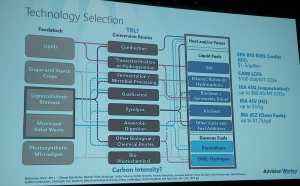

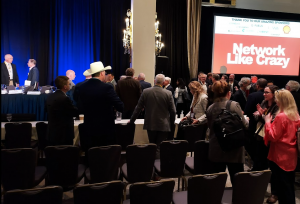
.jpg)





Comments are closed.